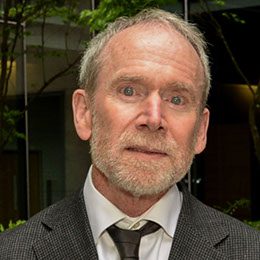Fields of Research
- Drug Discovery & Precision Medicine
- Intracellular Signaling
- Molecular Basis of Disease
Research Summary
The Moon lab was principally interested in the mechanisms which underly the formation of mesoderm and the central nervous system in vertebrate embryos.
Research Statement
In the late 1980’s the Drosophila segment polarity gene wingless, encoding a secreted intercellular signaling polypeptide, was found to be related to a mouse proto-oncogene, now named Wnt-1. Misexpression of Wnt-1 in Xenopus embryos led to the duplication of the embryonic axis–an unexpected and highly specific abnormality, which supported the likelihood that Wnt-1 was a signaling factor. These observations led us to explore the existence, expression, activities, and possible functions of the Wnt gene family in Xenopus and zebrafish, and to pursue the mechanisms by which these and other vertebrate genes related to Drosophila segment polarity genes participate in patterning within mesoderm and the central nervous system.
It is now apparent that vertebrate embryos express approximately a dozen Wnt genes during formation of mesoderm and the nervous system, that some Wnts continue to be expressed in the adult, and that these genes and their patterns of expression are highly conserved during evolution. The Moon lab focused on those Wnts expressed prior to or during gastrulation in frogs and zebrafish, and which are candidates for being signaling factors involved in early specification of cell fate. These embryos have been particularly useful for transient expression of Wnts, enabling the Moon lab to investigate whether there are distinct Wnt activities, the signal transduction pathways modulated by Wnts, the cellular targets of these signaling pathways, and how cells respond in real-time to Wnt signals to affect specific developmental processes.
Primary projects in the Moon lab focused on 1) the signal transduction pathway of Wnts, 2) cell physiological responses to Wnt signals, and 3) the roles of Wnts in embryonic processes. Dr. Moon is retired, but is very much interested in ongoing research on Wnt signaling and cellular development
Awards and Honors
2015 Elected to the National Academy of Sciences
2015 University of Washington School of Medicine Lifetime Innovator Award
2013 Elected to the American Academy of Arts and Sciences
2011 Elected to the Washington State Academy of Sciences
2009 Stem Cell Innovator Award, GeneExpression Systems, Inc.
2007-present Recipient, William and Marilyn Conner Chair, Institute for Stem Cell and Regenerative Medicine
2003-2006 T.L.L. Temple Foundation Discovery Award, Alzheimer’s Association
2000 Fellow, American Association for the Advancement of Science
1990-1994 Research Career Development Award, National Institutes of Health K04AR01837, (ending upon HHMI appointment)
1985-1989 Syntex Scholar in Cardiovascular Research, Syntex, Inc.
1986-1989 March of Dimes Basil O’Connor Starter Research Award
1984 EMBO Short-term Fellowship for Study Abroad
1983-1984 Postdoctoral Fellowship, American Cancer Society PF-222
1982 Postdoctoral Fellowship, National Institutes of Health IF 32GM09100-01
1980-1982 National Research Service Award, National Institutes of Health
HD07183, University of Washington

Randall Moon
Emeritus Professor
Affiliations
UW Department of Pharmacology
Howard Hughes Medical Institute
Institute for Stem Cell and Regenerative Medicine

Randall Moon
Emeritus Professor
Affiliations
UW Department of Pharmacology
Howard Hughes Medical Institute
Institute for Stem Cell and Regenerative Medicine
Faculty
- Building:
- 850 Republican Street
- Room:
- S524
- Box:
- 358056
Lab
- Building:
- 850 Republican Street
- Box:
- 358056

Randall Moon
Emeritus Professor
Affiliations
UW Department of Pharmacology
Howard Hughes Medical Institute
Institute for Stem Cell and Regenerative Medicine

Randall Moon
Emeritus Professor
Affiliations
UW Department of Pharmacology
Howard Hughes Medical Institute
Institute for Stem Cell and Regenerative Medicine

Randall Moon
Emeritus Professor
Affiliations
UW Department of Pharmacology
Howard Hughes Medical Institute
Institute for Stem Cell and Regenerative Medicine
Select Publications
Metabolism as an early predictor of DPSCs aging.
Macrin D, Alghadeer A, Zhao YT, Miklas JW, Hussein AM, Detraux D, Robitaille AM, Madan A, Moon RT, Wang Y, Devi A, Mathieu J, Ruohola-Baker H.
Sci Rep. 2019 Feb 18;9(1):2195. doi: 10.1038/s41598-018-37489-4.
Folliculin regulates mTORC1/2 and WNT pathways in early human pluripotency.
Mathieu J, Detraux D, Kuppers D, Wang Y, Cavanaugh C, Sidhu S, Levy S, Robitaille AM, Ferreccio A, Bottorff T, McAlister A, Somasundaram L, Artoni F, Battle S, Hawkins RD, Moon RT, Ware CB, Paddison PJ, Ruohola-Baker H.
Nat Commun. 2019 Feb 7;10(1):632. doi: 10.1038/s41467-018-08020-0.
ALPK2 Promotes Cardiogenesis in Zebrafish and Human Pluripotent Stem Cells.
Hofsteen P, Robitaille AM, Strash N, Palpant N, Moon RT, Pabon L, Murry CE.
iScience. 2018 Apr 27;2:88-100. doi: 10.1016/j.isci.2018.03.010.
High-Throughput Screening Enhances Kidney Organoid Differentiation from Human Pluripotent Stem Cells and Enables Automated Multidimensional Phenotyping.
Czerniecki SM, Cruz NM, Harder JL, Menon R, Annis J, Otto EA, Gulieva RE, Islas LV, Kim YK, Tran LM, Martins TJ, Pippin JW, Fu H, Kretzler M, Shankland SJ, Himmelfarb J, Moon RT, Paragas N, Freedman BS.
Cell Stem Cell. 2018 Jun 1;22(6):929-940.e4. doi: 10.1016/j.stem.2018.04.022. Epub 2018 May 17.
Publications

Randall Moon
Emeritus Professor
Affiliations
UW Department of Pharmacology
Howard Hughes Medical Institute
Institute for Stem Cell and Regenerative Medicine
